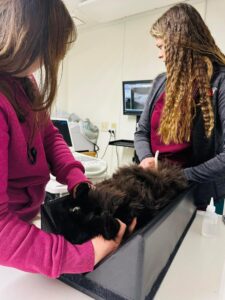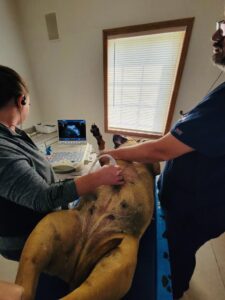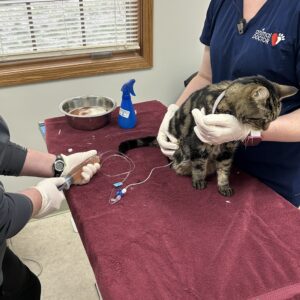Contact Us!
Abdominocentesis
Animal doctor provides Abdominocentesis/Abdominal Fluid Drainage procedures. We accept referrals and provide second opinions.
Description: An abdominocentesis is indicated for patients that have been diagnosed with fluid accumulation in the abdominal cavity. An abdominocentesis works to both alleviate the pressure and allow the animal to breath more comfortably, while also being useful as a diagnostic tool. The fluid can then be evaluated to determine type (heart related, blood, infection, cancer, etc.), potential causes and prognosis.
Symptoms & What to look for: Patients that need an abdominocentesis are likely in some level of distress varying from increased respiration rate to incapacitated/cannot rise or stand. Decreased energy level, increased respiration rate/effort, enlarged abdomen.
How does it happen? Fluid accumulation in the abdomen can happen due to several different factors. Some potential examples include infection secondary to a migrating grass awn, blood secondary from trauma (hit by car), or fluid production from different types of cancer or heart disease.


What questions do we ask?
- What changes have you noticed?
- How long have you noticed a change(s)?
- Any changes in activity level?
- Any changes in Appetite?
What are the steps we take to treat your pet?
- Physical examination and imaging (radiograph or ultrasound) to help guide us to a potential diagnosis.
- Pain medications will be given to help keep your animal calm while prepping them for the abdominocentesis procedure. After preparation, the abdominocentesis is performed to help drain the fluid away from the organs.
- Samples will then be sent off for further evaluation while we focus on stabilizing your pet.
- Treatment plan is based on pending diagnosis.
Animal Doctor Abdominocentesis potential treatment plans?
Oral medications
- Antibiotics to inhibit bacterial growth.
- Non-steroidal anti-inflammatory medications will be prescribed to reduce inflammation and help with pain control.
- Opioid pain medications will be prescribed if needed for extra pain control in severe cases.
Injections
- Opioid pain medications will be given as a part of the anesthesia plan.
- Non-steroidal anti-inflammatories might be given while under anesthesia.
- Antibiotics to inhibit bacterial growth.
What are the risks if the abdominocentesis is not performed?
Lack of diagnosis, prognosis and treatment plan moving forward. There are other indicators in the physical examination that can help guide us to a diagnosis, but ultimately a fluid sample is needed for definitive diagnosis.
Animal Doctor Provider
Dr. Wacker



